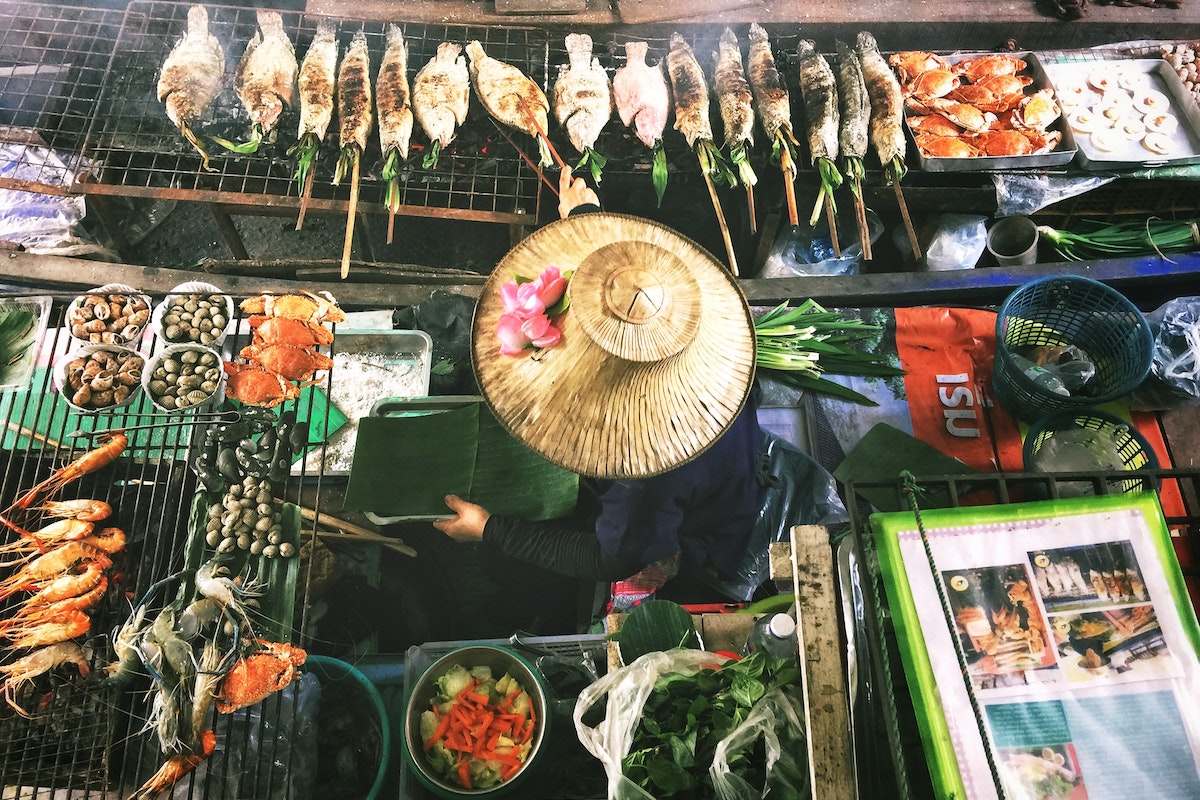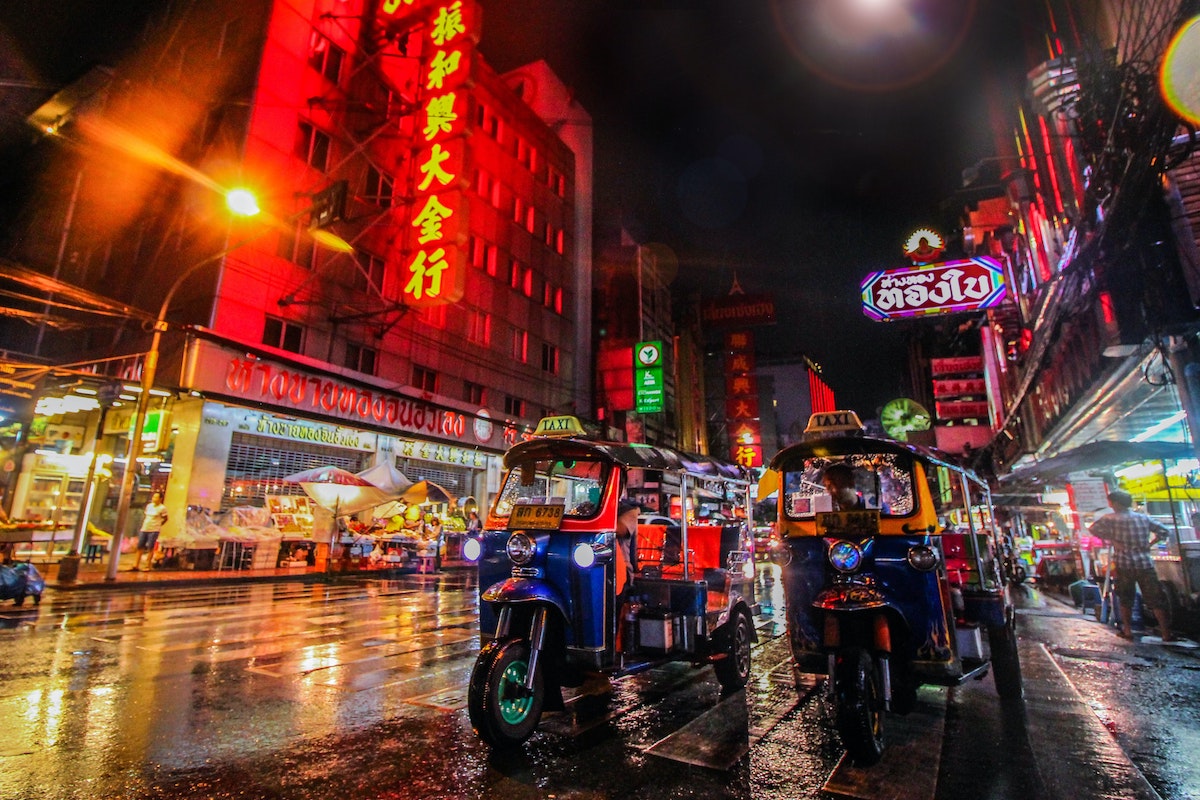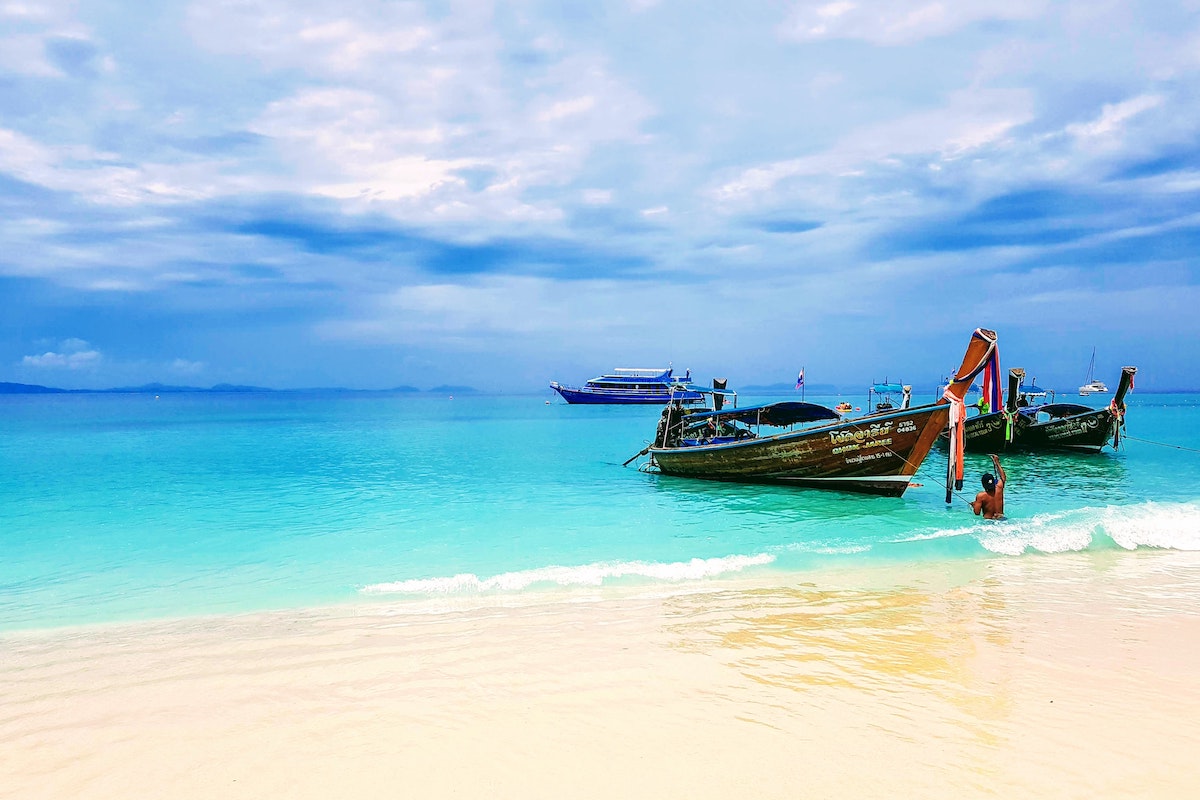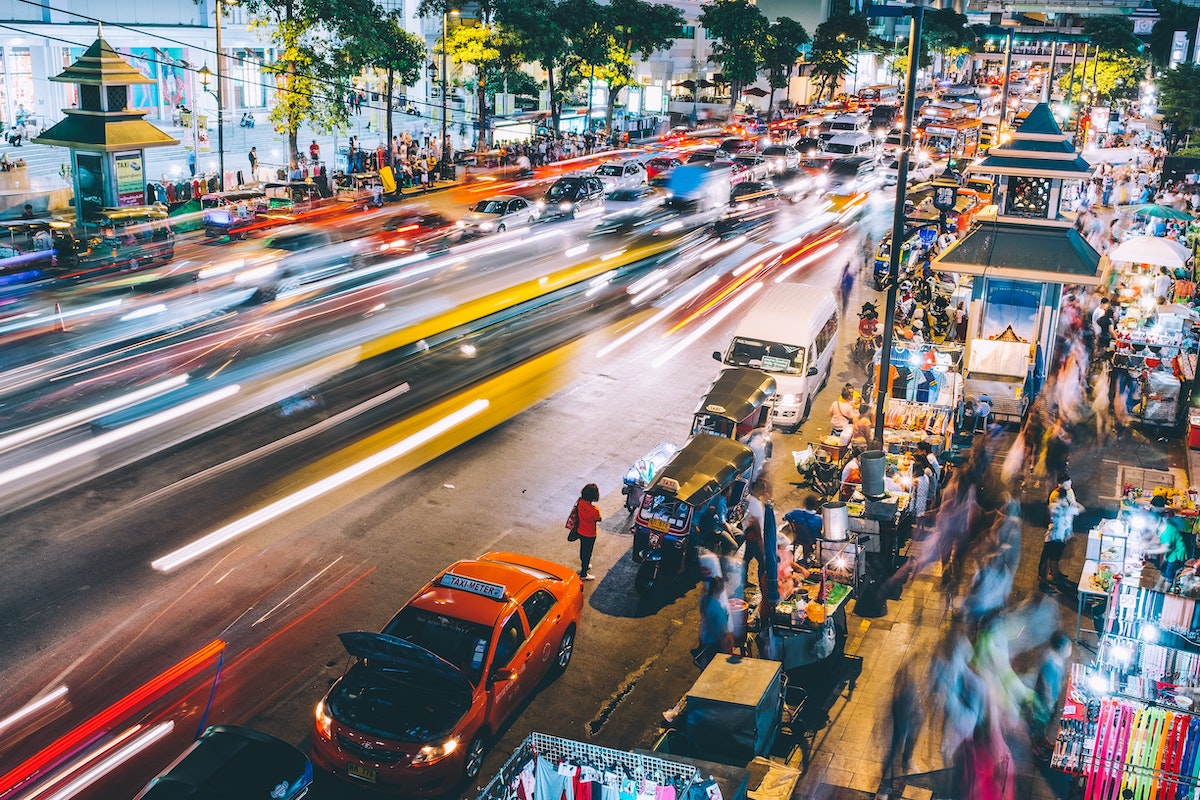
What’s the Cost of Living for Expats & Digital Nomads in Thailand?
By: Sarah Stone
Skip to Section
- Article Summary
- General Cost of Living and Housing in Thailand’s Major Expat Areas
- Street Food, Restaurant, and Grocery Costs for Expats and Digital Nomads in Thailand
- Transportation Costs for Expats and Digital Nomads in Thailand
- Healthcare Costs for Expats, Digital Nomads & Retirees in Thailand
- Wrapping Up
Article Summary
Thailand combines affordability with adventure—whether you want a buzzing city life, tropical beaches, or mountain serenity, you’ll find a budget-friendly lifestyle that supports remote work and long-term travel.
This cost of living breakdown covers everything from rent and food to healthcare and transportation across four of Thailand’s most popular destinations: Bangkok, Chiang Mai, Koh Samui, and Phuket. You’ll also get realistic numbers for groceries, street food, taxis, and common medical expenses—so you can plan your life abroad with confidence.
- Rent ranges from 8,200 to 22,300 baht per month for a one-bedroom apartment, depending on the city and location.
- Daily meals can cost as little as 30 baht for street food or 150 baht at a sit-down spot.
- Monthly living expenses—excluding rent—average between 11,500 and 24,000 baht depending on the area.
- Health insurance costs about $1,500 to $2,000 USD annually, and medical procedures are significantly cheaper than in the US.
- Transportation is affordable, with local metro rides starting at 17 baht and intercity train travel under 1,000 baht.
Longing for the expat life?
Ready to make the leap to living in a different country?
I don’t blame you!
Whether you’re looking for a change of pace, a different culture in which to immerse yourself, or a lower cost of living than you’ll find at home, there are countless reasons why packing up and hitting the road long-term can look enticing.
When it comes to cost of living for expats and digital nomads, Thailand should be near the top of your list. The country’s natural beauty and buzzing cities, mouth-watering food, and friendly people already are a major draw. And when you compare costs for things like housing, food, and transportation to what you might find in the US, UK, Canada, or Australia, you may find yourself planning your travels sooner than later.
Prices in this article are based on Thai baht—click here for a quick conversion from baht to your local currency.
General Cost of Living and Housing in Thailand’s Major Expat Areas
Thailand’s cost of living varies depending on where you want to go—let’s look at a few popular destinations for digital nomads, expats, and other travelers who are staying in the country longer-term.
Cost of Living for Expats and Digital Nomads in Chiang Mai
Based in northern Thailand, Chiang Mai is a fantastic place to settle for a little while, or even permanently. A wonderful blend of modern and traditional, you’ll find Buddhist temples, elephant sanctuaries, spas and jungle adventures, markets and night bazaars, and so much more.
According to Numbeo, you can:
- Rent a one-bedroom apartment in the city center for just over 14,500 baht per month
- Rent a one-bedroom apartment outside of the city center for about 8,200 baht per month
- Live comfortably on about 17,900 baht per month, not including rent
Not bad!
Cost of Living for Expats and Digital Nomads in Koh Samui
If you’re more interested in the beach, Koh Samui may be the right place for you! It’s Thailand’s second-largest island, and more laid back than the major cities. Choose from beaches like Chaweng, Thongtakian, Lamai, Maenam, and others—all with varying levels of development or seclusion. There are several Buddhist temples you can visit here, as well as gardens, waterfalls, a marine park, and other places of natural beauty.
If you want to live for a while in Koh Samui, you can:
- Rent a one-bedroom apartment for about 13,000 to about 18,000 baht per month, depending on the location
- Do very well with an additional 11,500 baht per month, not including the apartment
Certain expenses on the islands can be higher than the mainland because of shipping costs and availability of land—if you want to make Koh Samui or another island your home for a little while, make sure to research the right locations for your budget.
Cost of Living for Expats and Digital Nomads in Bangkok
One of the most popular destinations for travelers of all types visiting Thailand, the capital city of Bangkok is famous for its beautiful Wat Arun, floating markets and night markets, Grand Palace, and much more. It’s also a great place to live if you want to experience some of the best spas in the world, and have easy access to top-notch (and comparatively affordable) healthcare.
If you’re ready to make the leap to living in Bangkok:
- Renting a one-bedroom apartment in the heart of the city would cost about 22,300 baht per month
- Renting a one bedroom apartment outside of the city center could cost half of that
- Outside of your apartment, expect to spend about 21,400 baht per month
Cost of Living for Expats and Digital Nomads in Phuket
Another dreamy place for expats and digital nomads wanting to enjoy the sun and the sand, Phuket is a tropical paradise with plenty of outdoor activities and easy access to other islands for exploration and relaxation. You’ll also find amazing nightlife and incredible street food here.
- Expect to spend between 14,300 and 19,500 baht to rent a one-bedroom apartment, depending on the location
- Not including rent, your total cost of living for one month on Phuket should cost around 24,000 baht

Photo by Lisheng Chang on Unsplash
Street Food, Restaurant, and Grocery Costs for Expats and Digital Nomads in Thailand
Thailand offers some of the most delicious and exotic foods on the planet. Restaurants (air conditioned and open-air), street food, and supermarkets all are affordable—especially if you’re more interested in local food than Western meals.
You can get pad thai for about 30 to 40 baht from a street vendor, and if you eat a basic meal in a restaurant, it’ll set you back about 90 to 150 baht. A three-course meal at a nice restaurant would cost about 800 baht for two people.
When grocery shopping, you can expect to spend more on meat and fish than on vegetables, fruits, noodles, and rice.
- A pound of rice costs about 30 baht
- A pound of chicken filets would cost about 65 baht
- A bottle of domestic beer would be about 57 baht
- A bottle of water would cost you about 16 baht

Photo by Florian Wehde on Unsplash
Transportation Costs for Expats and Digital Nomads in Thailand
Travel costs around Thailand depend on your mode of transportation—let’s look at a few of the main ones.
- Metro: The Bangkok MRT has four lines. A single journey ticket starts at 17 baht and will increase if you’re on a longer trip and changing lines.
- Taxi: Usually starts from 35 to 75 baht, depending on your location (for example, taxis in Bangkok cost less than those in Phuket)—tuk tuks tend to be cheaper, but you’ll want to agree on a price in advance if you use one.
- Bus: If you’re in Bangkok, the bus costs range from about 8 to 12 baht depending on whether you’re taking a regular route, express route, or an air conditioned bus—prices are more expensive late at night as well.
- Train: Most trains you’ll find in Thailand have first, second, and third class options, with second class being the best bang for your buck if you’re looking for something comfortable and affordable. For example, a second-class seat on a train from Bangkok to Chiang Mai (about 10 to 13 hours depending on the train) may cost about 750 to 940 baht.
- Cars: According to Numbeo, you can buy a Toyota Corolla sedan, or equivalent new car, for about 946,000 baht. A gallon of gas costs about 163 baht.

Photo by The DK Photography on Unsplash
Healthcare Costs for Expats, Digital Nomads & Retirees in Thailand
Thailand is an extremely popular destination for medical tourism, with top-notch hospitals and practitioners, so if you’re looking to live in the country for the longer-term, or even retire abroad, you’ve made a good choice.
While Thai citizens have free medical care, expats and other travelers must pay for their own—you’ll need some kind of health insurance while you’re in Thailand so that you can cover things like accidents, extended hospital stays, medications, and more. Health insurance for expats in Thailand can cost about $1,500 to $2,000 per year (quoted here in USD), and in general, costs of medical care are drastically cheaper in Thailand than in the US. Health insurance costs of course vary depending on your personal medical needs.
Let’s look at a few examples of medical costs in Thailand:
- Annual checkup: 3,560 baht
- Overnight stay in hospital: 11,900 baht
- Normal birth: 75,000 baht
- Cesarean birth: 112,500 baht
- LASIK: 75,000 baht
Before traveling to Thailand, make sure you can get your prescription medications—drug laws are very strict here, and you’ll need to check that you’re not bringing anything in illegally (and that you follow the country’s rules for reporting your prescription). Prescription medications in Thailand tend to be much lower than those in the US, particularly if you opt for the generic versions.
Wrapping Up
Whether you’re a digital nomad, looking to settle in a different country longer-term, or even if you want to kick up your feet and retire abroad, Thailand is an excellent place to do it. With a low-cost, low-stress lifestyle, you’re bound to find exactly what you want here, within your price range.
Want to read more about living and traveling in Thailand? See all of our guides and stories here!
About the Author
 As the editor-in-chief of Frayed Passport, my goal is to help you build a lifestyle that lets you travel the world whenever you want and however long you want, and not worry about where your next paycheck will come from. I've been to 20+ countries and five continents, lived for years as a full-time digital nomad, and have worked completely remotely since 2015. If you would like to share your story with our community, or partner with Frayed Passport, get in touch with me using the form on our About page.
As the editor-in-chief of Frayed Passport, my goal is to help you build a lifestyle that lets you travel the world whenever you want and however long you want, and not worry about where your next paycheck will come from. I've been to 20+ countries and five continents, lived for years as a full-time digital nomad, and have worked completely remotely since 2015. If you would like to share your story with our community, or partner with Frayed Passport, get in touch with me using the form on our About page.Featured image by Evan Krause on Unsplash.
Information published on this website and across our networks can change over time. Stories and recommendations reflect the subjective opinions of our writers. You should consult multiple sources to ensure you have the most current, safe, and correct details for your own research and plans.
Frayed Passport is a participant in the Amazon Associates Program, an affiliate advertising program designed to provide a means for sites to earn advertising fees by advertising and linking to Amazon.com. We also may share links to other affiliates and sponsors in articles across our website.





